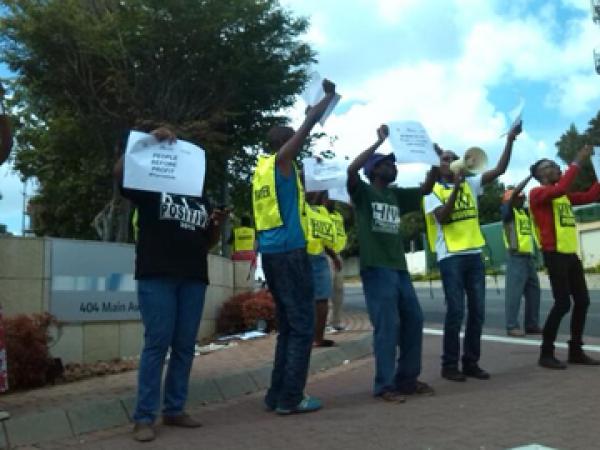The week in activism

This week we have reports on Abahlali baseMjondolo and the Phillipi settlement named after Marikana, a new book by SERI, Greenpeace and fracking and facts and fibs in the President’s state of the nation speech as explained by Africa Check. Also, the SJC and others have published a report on the Khayelitsha Inquiry into policing.
Abahlali baseMjondolo march for rights in Marikana Land Occupation
Following what Abahlali describes as the illegal destruction on 7 and 8 January of dozens of people’s homes by the City of Cape Town, the Marikana community will march on 19 February from Cape Town central train station to their court appearance at the Cape High Court.
Abahlali says the march is a show of force to demand that the City rebuild the homes. The marchers say that the homes were occupied at the time by people who had been living in them for months before the City’s Anti-Land Invasion Unit arrived. They also say demolition was also done without a court order giving permission to forcibly remove the residents on the vacant land.
For further information contact Yolanda on 0730366060, Siphiwo on 0785000469, or Tumi on 073 2182410.
In related news, SERI (Social Economic Rights Institute of South Africa) has just published a detailed report on Evictions and Alternative Accommodation in South Africa: An Analysis of the Jurisprudence and Implications for Local Government, setting out the rights, duties and obligations of the various parties involved in eviction proceedings. It describes how the jurisprudence (case law) has incrementally developed housing and eviction law, specifically highlighting the implications for local government.
Greenpeace discussion on fracking
Fracking, the process of blasting water, sand, and chemicals underground to free gas and oil from shale rock, has been a hotly debated subject for some time in Southern Africa. Groups such as Treasure the Karoo Action Group (TKAG) have unequivocally condemned the activity, while government hedges its bets.
On the 19 February, Greenpeace Africa will hold a colloquium, Fracking: A Civil Society Perspective, at the Cape Town Science Centre in Observatory with a panel of experts looking at fracking from various angles - how it affects communities, what it does to the water supply, and the lessons learned in the USA, where, Greenpeace says, “fracking has already riddled the country with pipes, crevices and scars, altering not only the landscape, but damaging water supply … South Africa has an abundance of sun and wind resources, and so we should be transitioning away from dirty, outdated fossil fuels, and towards a renewable energy-powered future.”
You can join or see the conversation online with the #WhyFrackSA hashtag.
What the president didn’t tell you
Africa Check has done an informative fact check on President Jacob Zuma’s 2014 State of the Nation address. The analysis yields important contextual information for claims made by the President in parliament such as the number of work opportunities created over the past five years, the matric pass rate, the percentage of households with access to water, the growth in the tourism industry, the drop in the crime rate, the country’s economic growth, the success of government’s HIV prevention campaign, the number of new houses built, and the progress made on land redistribution,
To see how accurate and truthful the President was in his speech go to: http://africacheck.org/reports/a-first-look-at-president-jacob-zumas-201…
It’s an excellent read.
Organisations issue joint report on the Khayelitsha inquiry into policing
The Social Justice Coalition, Treatment Action Campaign, Ndifuna Ukwazi, Equal Education & Triangle Project has issued a two page report on the Khayelitsha Police Commission of Inquiry detailing the evidence provided by Colonel Michael Reitz, Station Commander of Lingelethu West police station on 13 February.
The report highlights “the failure of the City of Cape Town and the provincial government to address [policing] failures with sensitivity and on an inclusive basis”, and “the breakdown in confidence, and the need for stronger links, between the community, the Community Police Forums (CPFs) and the police”.
Read the report here: Report on Commission Evidence – 14 February 2014.
Support independent journalism
Donate using Payfast


This article is licensed under a Creative Commons Attribution-NoDerivatives 4.0 International License.
